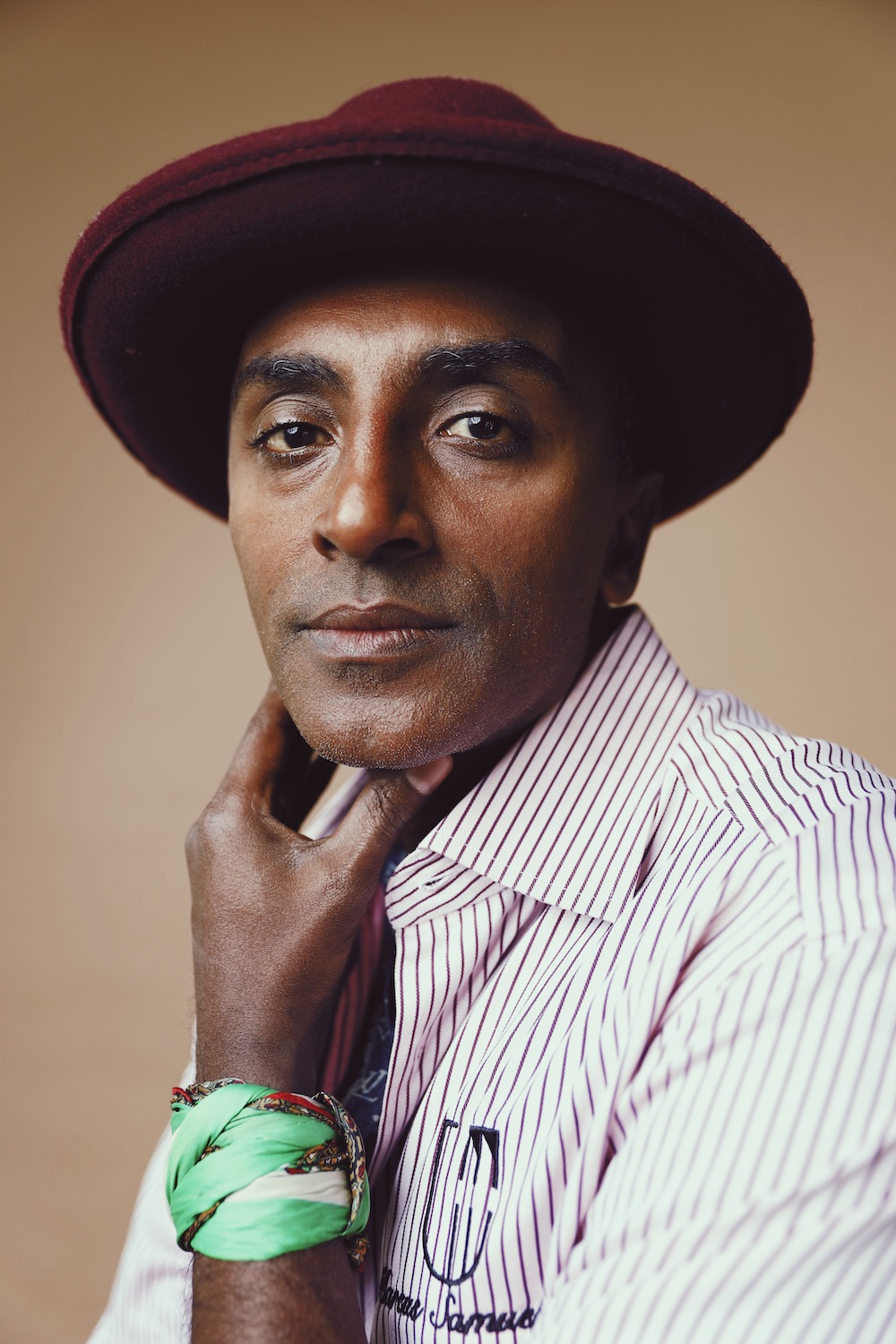The recipe for success is grounded in diversity and community according to this world-renowned chef.
There are many parallels that can be drawn between leading a kitchen and navigating life. Both take leadership, focus, perseverance, and, above all, passion to get you through the ups and downs — something internationally renowned chef and restaurateur Marcus Samuelsson knows all about.
With 12 restaurants across the world, a James Beard award, celebrity appearances on Food Network shows, and his own six-part travel series on PBS (just to name a few accomplishments), success is something Samuelsson has known intimately, though the journey has not been without tribulations. While he first made a name for himself as the executive chef of Aquavit in New York in the 1990s, his story actually began 7,000 miles away in Ethiopia. Born in a village, Samuelsson was adopted alongside his sister as young children by a white family in Gothenburg, Sweden, after his mother died from tuberculosis. This fusion of cultures would later inform much of his culinary vision and reinforce his belief in hard work and breaking barriers. “Being an African man raised in Sweden and trying to cook in these kitchens, I couldn’t just be good. I had to be the best. I had to work harder. It taught me a lot,” said Samuelsson.
His most recent venture will see him at the helm of the self-titled restaurant Marcus, opening in the Four Seasons hotel in Montreal in 2019.“Our goal is to create a delicious, sticky space that people want to come back to. We want people to engage with us and really talk to us,” explains Samuelsson.
If he exemplifies anything, it’s that success lies in the power of personal connections—whether to a place, people, or food. Here are some of the lessons he’s learned along the way.
Let Passion Drive You
“Being a chef is not that different from being an entrepreneur in the business world. Whether you’re opening a restaurant or starting a different kind of business, you must be passionate about what you’re doing. If you’re in it for money or fame, it won’t work. You have to be genuinely passionate about having something to say and wanting to share that with people. Otherwise, don’t do it. Life and work have a lot of ups and downs. But you have to embrace that if you make the commitment of working, and that’s what I’m doing. If you’re passionate about what you’re doing, it will carry you through.”
Find Power in Diversity
“It’s important to know who you are and where you come from. Many of our strengths come from our differences. Food has travelled through migration and immigrations for thousands and thousands of years. Delicious food is always happening around diversity. That concept is powerful in any business; find diversity and embrace the differences. I’m blessed to have grown up in a very diverse family and to be an immigrant six times over. I can relate to standing on the border when all you want is to get in, add value, and work hard. That’s a very specific feelingUnless you have done that or someone in your family has done that, I don’t think you can fully understand what the power of aspiration can do. There are strong bonds in that. I’ve learned so much about myself and about my commitment to adding value and working hard. Diversity is how the world and business move forward.”
Always Give Back
“Community matters. It was one of my goals when I was a kid: to be able to have a dialogue with the public. The only way to maintain that is to keep working and give back. The word ‘restaurant’ means to restore. When you look at unemployment rates, or how many African-American men aren’t working, those things matter. Leading a kitchen and creating jobs is how I lead as a black man. For us, when we create something, we hire locally. But it’s also important to go beyond just the business [and] become a part of that community; help restore it and provide opportunities. Living in Harlem with my family, I see the improvement, I see the expansion of the farmer’s markets. We created the Harlem EatUp! Festival and to now see so many people come, it’s beautiful. It’s about building bridges and restoring your community. That’s what restaurants and businesses can do.”
To Lead is to Let Others Learn
“When you’re leading a team, you become a teacher, but sometimes you forget that giving people the answer isn’t always the best thing. Sometimes it’s about the process. Sometimes being a good leader means getting out of the way and letting your team learn on their own to become stronger, more creative people. It helps us all evolve.”




Never Stop Learning and Sharing
“I’ve had many mentors that have helped me. I admire someone like Daniel Boulud because you can call him anytime and he will teach you something. He’s a giver and a sharer. I admire Leah Chase, from New Orleans. She’s had a restaurant since the 1940s and is 95 years old and still working. How can you not admire that? These are people that are rich in culture, but also rich in terms of what they want to share. Mentorship doesn’t go away, and now I’m a mentor to a lot of people. Mentorship is not youth based, it’s experience based. I’m in my 40s, I have young mentors too that teach me about technology, and what’s relevant right now. Mentorship is ever evolving. You are never too old or too experienced to learn from your team or your peers. Similarly you should always be willing to pass on the lessons you’ve learned.”
Talk it Out
“Talk to each other. Talking is much better than sending an email or texting. Things can be misinterpreted 50 different ways: it’s easier to say, “Let’s talk.” No matter where I am in the world, I check in with my team; weekly meetings help us function. This is crucial. With partnerships or businesses, when you’re in an industry that is international, what’s culturally appropriate in one part of the world may not be in another part and some of that gets misunderstood if you don’t talk about it. With my team we always talk through our process and thoughts and so on. Challenges will always be there. I look at challenges as great opportunities to learn, it’s important to be able to talk and communicate openly and admit when you’re wrong or when something isn’t working. It’s okay to be imperfect. Look forward to the opportunity to get better.”
Be Humble and Do Your Homework
“I came to [the U.S.] with $300 in my pocket. Now we have over 10 restaurants in different countries with hundreds of employees. Even though my heart and soul is in cooking, to continue to be able to create and expand, I have to be entrepreneurial. But you can’t let money be your motivator. When it comes to success or money, you need to have humility. You need to realize that you will have some really good days, but you will also have some really bad days. Things can change instantly. To be an entrepreneur, you and those around you need endurance and focus to overcome those challenges. It’s important to be passionate and curious, but also do your homework about the space, business, product—whatever it is. Be willing to put in the hours and do the homework. Be willing to collaborate and learn from others. If you do that, you’re going to have a good thing going.”
Listen to Your Customers
“I live in Harlem. People express themselves every day when I’m walking from my brownstone to my restaurant [Red Rooster]. And it’s everything from, “Why has the chicken changed price?” to “The cocktail needs to be bigger.” Some people will say “Can my uncle get a job?’ or “We have this charity you should be involved with.” It’s important that our staff is sensitive to what the customers are telling us. We can’t have any intimidation. That’s why we have the open kitchen concept: people can come up and talk to us. It’s important to build a trusted environment where people feel like their opinions matter and that they can share their thoughts. I can’t have a strong hierarchy where nobody is speaking but the chef. You have to create a very transparent environment where all staff members are locally invested, and also where your guests and customers are part of the journey.”
Curiosity is Key
“It’s all about curiosity. Stay curious about the place and the people you meet. Food, for me, has taken me all over the world. It’s taught me to always stay curious and to never stop learning. Local rituals in Japan are very different than Japanese-American ones. I learned the difference between Sweden and Norway. Wherever you are, whatever you are doing, you have the opportunity of learning about localism, and how beautiful that is. In both work and life, you should learn to celebrate differences and at the same time celebrate similarities. Collaborations are what it’s all about. Keep feeding your curiosity.”










